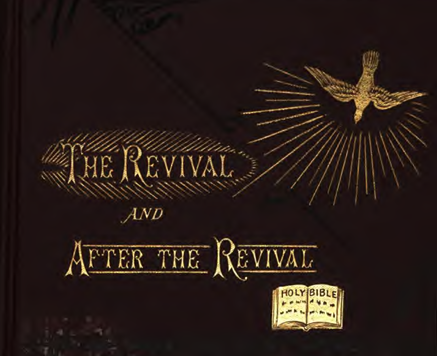- The Revival and After the Revival – Chapter I.
- The Revival and After the Revival – Chapter II.
- The Revival and After the Revival – Chapter III.
- The Revival and After the Revival – Chapter IV.
- The Revival and After the Revival – Chapter V.
- The Revival and After the Revival – Chapter VI
- The Revival and After the Revival – Chapter VII
- The Revival and After the Revival – Chapter VIII
- The Revival and After the Revival – Chapter IX
- The Revival and After the Revival – Chapter X
- The Revival and After the Revival – Chapter XI
- The Revival and After the Revival – Chapter XII
- The Revival and After the Revival – Chapter XIII
- The Revival and After the Revival – Chapter XIV
- The Revival and After the Revival – Chapter XV
- The Revival and After the Revival – Chapter XVI
- The Revival and After the Revival – Chapter XVII
- The Revival and After the Revival – Chapter XVIII
- The Revival and After the Revival – Chapter XIX
- The Revival and After the Revival – Chapter XX
- The Revival and After the Revival – Chapter XXI
- The Revival and After the Revival – Chapter XXII
- The Revival and After the Revival – Chapter XXIV
- The Revival and After the Revival – Chapter XXIII
Is there, however, to be no restraint? Is the realm of religious experience beyond all laws of human emotion? Is “common sense” to be rejected and “taste” to be ignored because human souls seek salvation? Is the apostolic law of decency and order, and the subjection of prophets to the spirit of the prophets, annulled?
This question becomes more important when you think about the flaws in human nature, which show up in religious life as well as everywhere else. Sometimes, a loud person will claim “rights” in a religious meeting to bring themselves to the forefront. Self-righteousness sometimes jumps at the chance to show off how “powerful” and “divine” it is by making a lot of noise and saying a lot of words. Sometimes a very mean and little spirit of spite finds pleasure in disturbing more “particular and proper brethren” and in vaunting its liberty before them. People who are very weak and hysterical sometimes mix up their feelings with their religious beliefs and their emotions with real life. Sometimes, out of habit—the habit of expression—that was formed in the excitement of a long-ago revival and kept up as “sound” after the Spirit had left, someone does something that is empty, pointless, and unpleasant, which offends people with good taste a lot and rightly so.
Here, too, are our young people, well-educated, students in high schools, members of the most intelligent society, reverent, honest, dignified, with a knowledge of the laws of nervous action, and able to distinguish clearly between supernatural movements that overwhelm with their divine energy and human demonstrations that come from habit or are born with less worthy motives. Are we to give unrestrained freedom to those who want and are determined to speak, sing, respond, groan, or interrupt others—and all this because we dare not impeach motives, tamper with spiritual life, or limit the liberty of God’s people in God’s house?
Just here, the church and her ministers need great discretion. If saints who crave such liberties are not absolutely infallible, there may be a place for wisdom and limitation. Let us hail the mighty and irresistible sweep of supernatural power. Let us exercise tender charity toward simple-hearted old saints whose daily lives lend a charm to their eccentricities and justify the liberty they have always enjoyed. Let us give free play to the soul that comes to our altars in agony because of sin, and let us join our doxologies with his halleluias over conscious deliverance from guilt, bondage, and despair. But—
By J. H. VINCENT
Updated 2023 Nathan Zipfel
